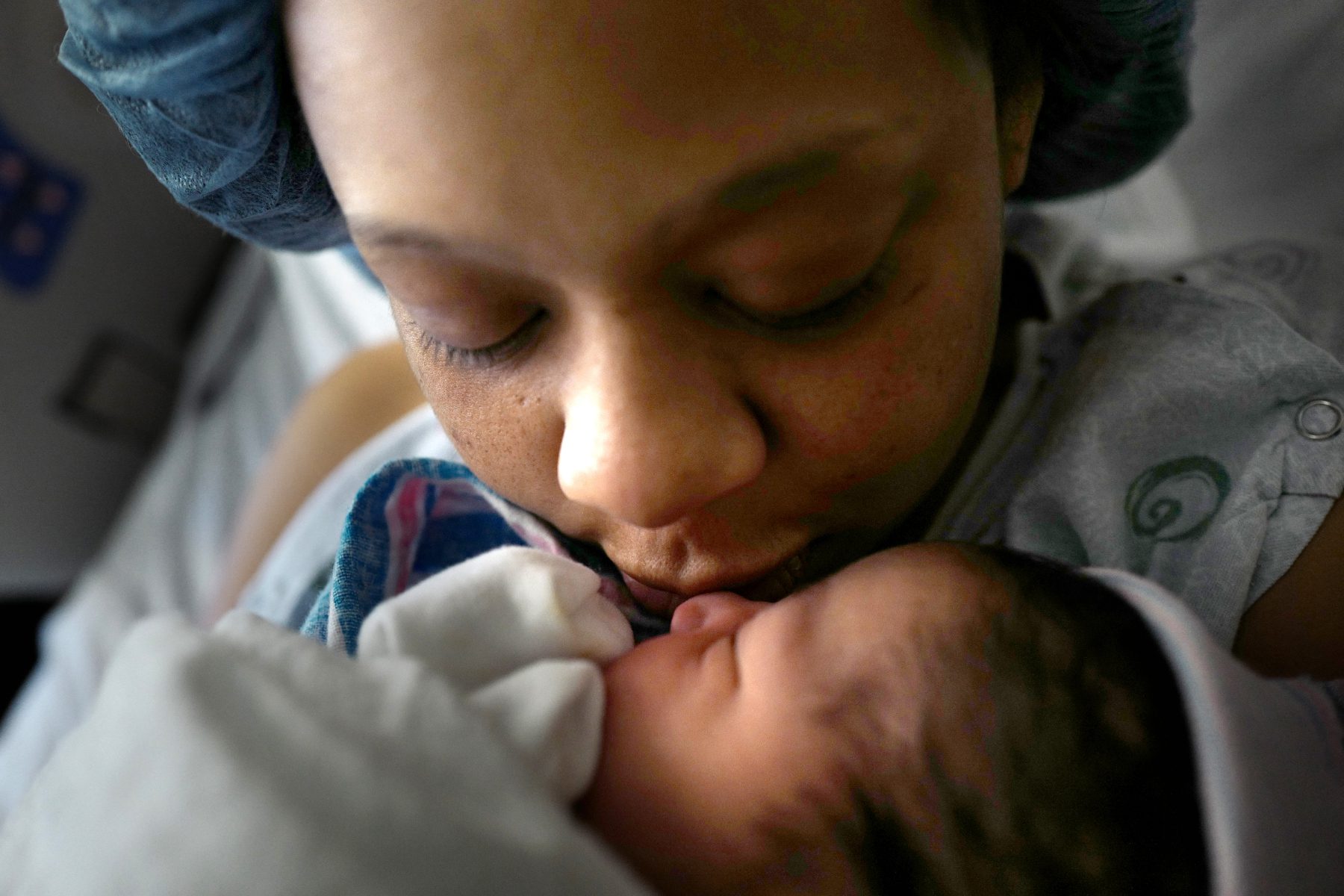There are no federal, nationwide standards for paid parental leave in the United States, and some American babies may be paying a price in early brain development. It’s yet another way that America’s paid parental leave predicament reinforces and perpetuates inequities with far-reaching consequences.
New research from the Infant Studies of Language and Neurocognitive Development Lab at New York University’s Steinhardt School of Education, currently in the pre-publication phase, indicates that among about 100 infants, those whose mothers had three months of paid parental leave experienced more advanced neurological development than those whose mothers only had access to unpaid leave during that same period of time.
This research, led by NYU’S Natalie Brito, an assistant professor of applied psychology whose work focuses on how to best support caregivers to foster healthy neurocognitive development in children, compared three months of paid maternity leave to three months of unpaid leave — the latter of which is available through the Family Medical Leave Act (FMLA). As it is, FMLA only provides up to 12 weeks of unpaid leave with the guarantee that a person can still return to their job — and its requirements on length of employment and company size mean that about 40 percent of private-sector workers fail to qualify.
Even after controlling for infant and family characteristics, Brito and her colleagues found through EEG imaging that infants of mothers who had three months of paid leave had more complex brain wave patterns. In short, simply having a birthing parent with access to paid leave is enough to give some children an immeasurable leg-up in life, and from their earliest days.
These early findings, even in a relatively small study, aren’t surprising to Brigid Schulte, the director of the Better Life Lab at New America, a nonpartisan think tank.
“In America, it’s illegal to separate a puppy from its mother before eight weeks, but in the United States, one in four mothers goes back to work within two weeks,” Schulte said.
High on the list of reasons paid leave would help a baby develop well, she said, is the parents’ sense of well-being. It’s why she isn’t surprised by Brito’s early research.
“Stress is a killer,” Schulte said. “It’s like a virus. If you are stressed, your infant can be stressed.” Infant stress can significantly impact the prefrontal cortex, she said, and babies’ brains begin developing from the moment they are born. Neurocognitive development is driven by a parent engaging with their baby — smiling, talking, reacting to sounds, noises and expressions. These are key neurocognitive factors which lay the foundation for all later brain development and learning. It’s also why Schulte said that she’s “not at all surprised nor should anyone be surprised that time where you feel supported leads to better outcomes.”
“We don’t need Baby Einstein,” she said. “We need paid leave.”
It’s also why the foundation of the existing family leave system in the United States, the Family and Medical Leave Act (FMLA), just doesn’t cut it. By only guaranteeing up to 12 weeks of unpaid leave and for only some qualifying American workers (disproportionately, those who are in higher-wage, large-scale professional environments), what’s on the table for most — but significantly far from all — American families is a system that this new research indicates may be setting their children up to fall behind from the day they are born.
And a major drawback of FMLA, Schulte said, is that “people aren’t using it because it’s not paid and they can’t afford it.”
FMLA’s biggest beneficiaries are traditionally White, college-educated mothers, Schulte says, who are more likely to be able to afford a period of unpaid leave from work. This distinction further drives socioeconomic inequities in the workforce, she pointed out.
Miriam Barcus, a visiting assistant professor of sociology at Kenyon College whose research focuses on gender inequities and parental leave policies, told The 19th that in her own research, she’s found that mothers will do whatever they can to maximize the amount of time they can take off of work following childbirth. But in the absence of a federally mandated paid parental leave policy, this often means taking unpaid leave, something many others simply cannot afford.
She also noted that paid parental leave, or lack thereof, also leads to the stratification of American families. In other words, paid leave is yet another example — and reinforcing factor – of a widespread system where some families in America have access to lots of resources and some do not.
Because things like paid leave can impact infant brain development and other things less easily measured like bonding, health of the birth parent, and postpartum depression, families who have less, and have access to less, become increasingly trapped in a lack of resource availability because of the outcomes a lack of resources yields.
“Children who grow up in advantaged families get additional advantages from the resources their parents have,” Barcus said. “Then it goes on to perpetuate these gaps between the resources families have, and the children who are born into them and what is then available to them.”
This is why so many federal lawmakers are trying to address this inequity through things like the Family and Medical Insurance Leave (FAMILY) Act, sponsored by Rep. Rosa DeLauro of Connecticut and Sen. Kirsten Gillibrand of New York, which, if passed by Congress, would provide workers with up to 12 weeks of paid leave at 66 percent of their monthly wages when they take time off to care for their own health or that of a family member, including in the context of the birth or adoption of a child. The wage requirements ensure that low- and middle-wage workers are able to have a higher share of their wages replaced, and the bill would cover workers at all companies, no matter their size.
Schulte points to some of the states, such as California, that have adapted their own programs for evidence of the way that paid parental leave begins to alleviate social inequities. Research looking at family outcomes once the state’s paid parental leave program was implemented found that the impacts for mothers of color and mothers who work low-wage jobs were especially significant. Not only did paid family leave reduce income inequality in the state, but mothers of color also reported being able to have more time at home with their infants and reported feeling more connected with their babies as a result of having access to paid leave, something that Schulte says is well-documented as being better for both the stress level and health of mom and baby both.
From her own research, Schulte cites the fact that birthing parents experience at least one symptom of childbirth at least six months after childbirth. “Birth is a major traumatic event for the body,” she said. “Paid leave is critical for children because it is critical for the birthing parent.”
Barcus found in her own research that the primary factor for predicting shorter leave after childbirth when you control for family and workplace factors was socioeconomic status, meaning women of color and those who had attained lower levels of education and workplace status took less leave. The current parental leave system in the United States, Barcus said, creates a situation where inequity is perpetuated because those who take leave, which is typically unpaid, do so because they can afford to. Not only do many women simply leave the labor market as a result of being faced with the choice of unpaid leave and leaving work altogether, but if and when they wish to return to the workforce later on, they have fewer years of accumulated experience. And this in turn perpetuates the gender wage gap.
Barcus explained that because of a lack of paid-leave policies for fathers — typically even less robust and available than those available to mothers — moms end up taking the brunt of the workplace consequences associated with taking time off. As fathers advance in their careers at rates that their partners do not, mothers end up by default more involved in daily childcare routines as children get older. With their careers often already on the backburner as a result of early differences in leave policies, it becomes the default for mothers to then assume the bulk of this household responsibility.
Something as simple as paid paternity leave can change this, Barcus said. “When fathers take time off, they learn from the beginning what their child’s needs are, what their cues for expressing their needs are — and they can then take a level of ownership of childcare that disrupts the ‘manager and helper’ dynamic, where mothers manage and fathers help out. For real intersectional gender equality, it’s important that men become part of the conversation about paid parental leave.”
Rep. Ayanna Pressley of Massachusetts is pushing in the House for change on this. “Adopting a meaningful universal paid leave policy is a matter of public health and is a gender, racial and economic justice issue that will protect the overall wellbeing of our families,” she said in an emailed statement to The 19th. “This new research makes it abundantly clear—paid leave is critical to a developmental strong start for our children.”
Pressley is not the only Massachusetts Democrat involved in this issue. Sen. Elizabeth Warren pushed for robust paid leave reforms during the 2020 presidential election as a candidate. Warren repeatedly stressed on the campaign trail how only 19 percent of civilian workers had access to paid family leave, with low-wage workers having even less access.. And as Brito’s new research already indicates, this lack of access to any leave — yet alone paid leave — has serious and lifelong implications on the children born to these parents.
In a statement emailed to The 19th, Warren explained why paid parental leave continues to be a focus of her legislative work: “Providing essential leave for workers will not only help build strong, healthy families as parents have the ability to spend the critical first weeks with their newborns, but it will also allow them to stay home when they and their loved ones have serious health issues — leading to fewer missed shifts and a stronger workforce.”
And also, it seems, stronger baby brains primed to take on so many other intersectional systems that can hold so many children back.







